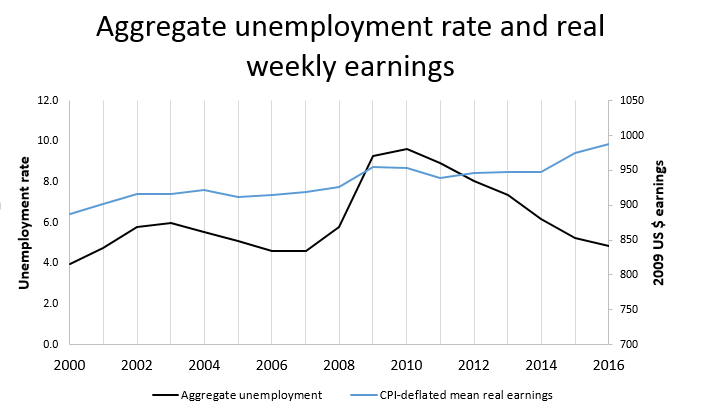
In his February 25 New York Times opinion piece “A time for immodest proposals” Ross Douthat quoted a right-leaning economist who stated that the US labor market is not doing well, with unemployment high and wages stagnating. This seems to be a general opinion, with Donald Trump complaining during the election campaign about high unemployment and Bernie Sanders arguing about falling living standards. With a carefully chosen base period for comparison, one can easily demonstrate either improving or declining conditions; but the correct basis is a time when unemployment is about the same as today’s 4.8%. As the figure shows, that time is 2000.
By historical standards today’s unemployment rate indicates we are about at full employment, and it is little different from 2000. Moreover, the post-inflation (real) earnings of the average worker (even using the usual, overstated measure of price inflation, the Consumer Price Index) have risen since 2000 at an average annual rate of about 0.6% per year. This growth is below what it was from 1945-1970, but not bad by historical standards.
So why all the complaining and malaise? First, politicians don’t defeat others by gloating how well things are going. Bemoaning the state of the economy paid off in 2016. Second, while the unemployment rate is low, about six million people are not seeking work as compared to what would have been expected in 2000. That’s their free choice—if people want to work less, who are we to object; but the American puritanical ethic may object to their choice? Finally, wage inequality continues to rise, with most rapid growth among the very highest earners. Perhaps the biggest problem in the US labor market is that most people do realize that their wages are growing, although fairly slowly, but see a very visible few getting further and further ahead of them.
© Daniel S. Hamermesh
Please note:
We recognize that IZA World of Labor articles may prompt discussion and possibly controversy. Opinion pieces, such as the one above, capture ideas and debates concisely, and anchor them with real-world examples. Opinions stated here do not necessarily reflect those of the IZA.